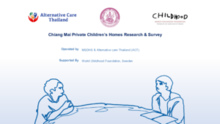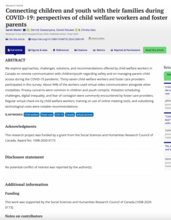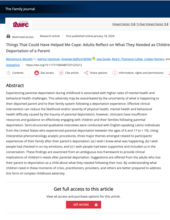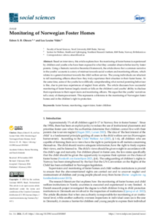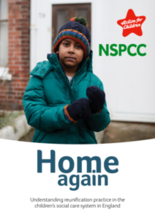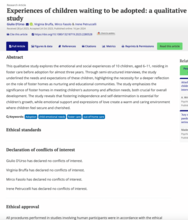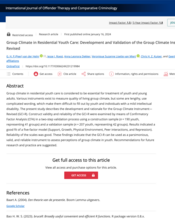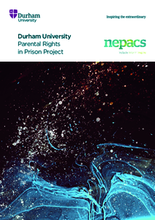Displaying 121 - 130 of 10190
This is a summary of children's homes in the Chiang Mai Province of Thailand over the last 1.5 years. The research team visited a total of 371 private children's homes. This summary provides an extensive and useful data set for those interested in the reform of private children's homes.
The authors explore approaches, challenges, solutions, and recommendations offered by child welfare workers in Canada on remote communication with children/youth regarding safety and on managing parent–child access during the COVID-19 pandemic.
This report presents findings from qualitative interviews conducted with English-speaking Latino individuals from the United States who experienced parental deportation between the ages of 6 and 17 years old. They offer suggestions about what they needed following their loss as a child. By understanding what children need in these moments of crisis, practitioners, providers, and others are better prepared to address this form of complex childhood adversity.
This article explores how the monitoring of foster homes in Norway is experienced by children and youths who have been exposed to what they consider abusive behaviour by foster parents. Using a thematic narrative theoretical framework, the article shows that a common narrative in the youths’ accounts is a story of mistrust towards social workers and monitoring officers, which relates to a general mistrust towards the child welfare service.
This report provides an in-depth analysis of the situation of children in alternative care and in adoption in Europe and Central Asia (ECA) based on available data from TransMonEE, as well as other sources such as MICS, DataCare and the Conference of European Statisticians (CES). It marks the first analysis of data on children in alternative care by the UNICEF ECA Regional Office since the publication of the ‘At home or in a home’ report in 2010, highlighting the developments and challenges in collecting and reporting data on children in alternative care and adoption and summarises recommendations derived from recent data review initiatives.
Young people who age out of state care are at risk of a range of negative outcomes. In England, national data provides only five indicators of care leavers’ lives and there are no measures of how young people themselves feel about their transition to adulthood. To fill this gap a new survey to measure subjective wellbeing was coproduced with 31 care leavers. The survey was then distributed by 21 local authorities and completed by 1804 care leavers.
Understanding reunification practice in the children’s social care system in England
This qualitative study explores the emotional and social experiences of 10 children, aged 6–11, residing in foster care in Italy before adoption for almost three years. Through semi-structured interviews, the study underlined the needs and expectations of these children, highlighting the necessity for a deeper reflection on the role of foster homes as nurturing and educational communities.
Group climate in residential youth care is considered to be essential for treatment of youth and young adults. Various instruments exist to measure quality of living group climate, but some are lengthy, use complicated wording, which make them difficult to fill out by youth and individuals with a mild intellectual disability. The present study based in the Netherlands describes the development and rationale for the Group Climate Instrument—Revised (GCI-R).
This is a report about the Parental Rights in Prison Project (PRiP) based in Wales and England aimed at supporting incarcerated parents who wished to sustain their relationship with their children who are in the care of the local authority, care of family and significant others or adopted and to provide them with legal advice and support around their rights as parents.

